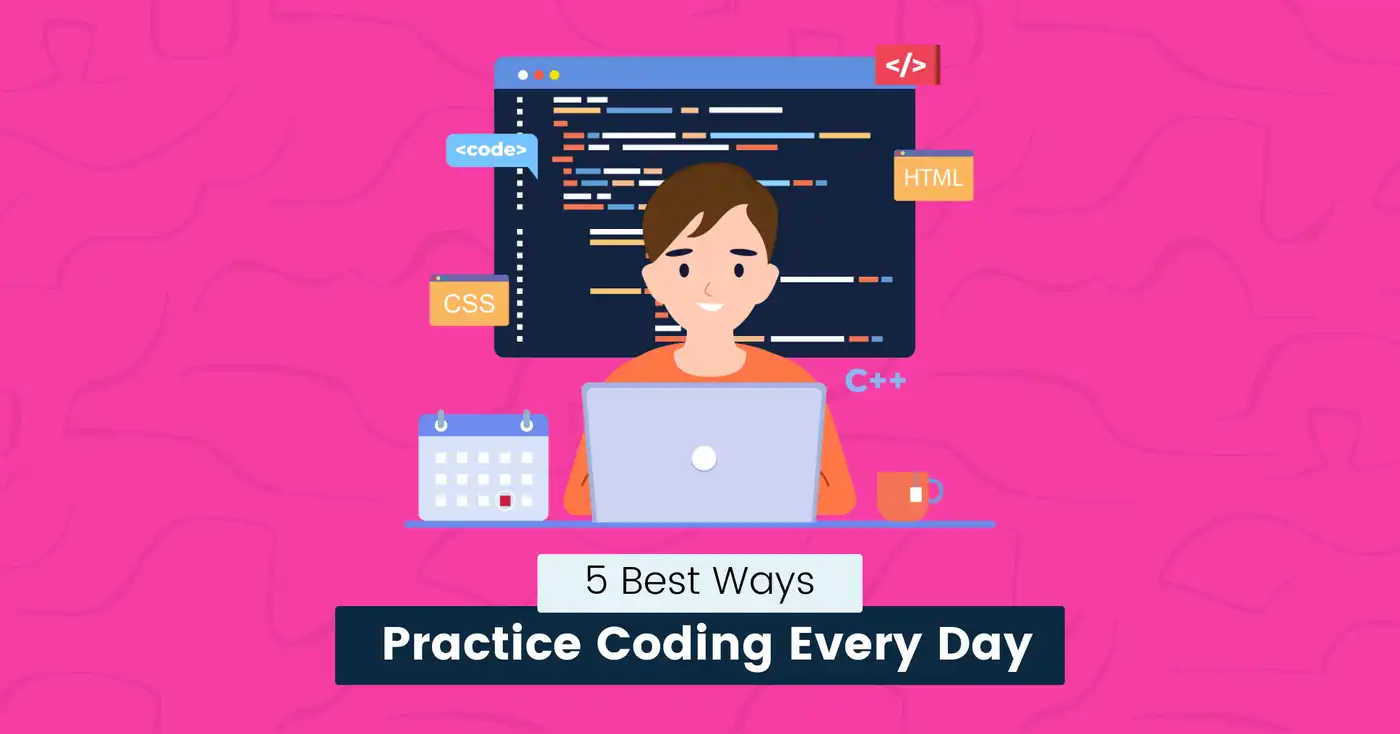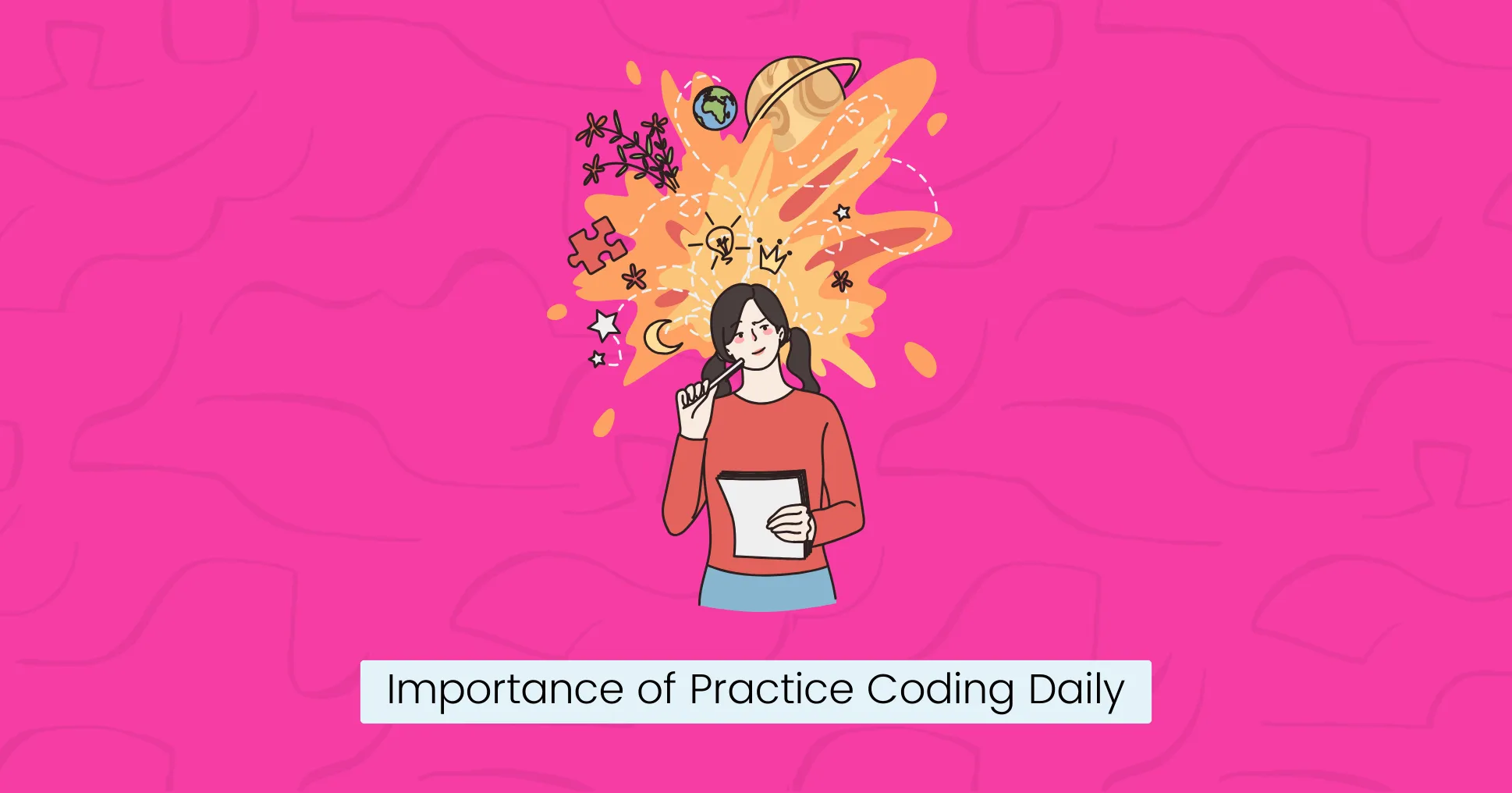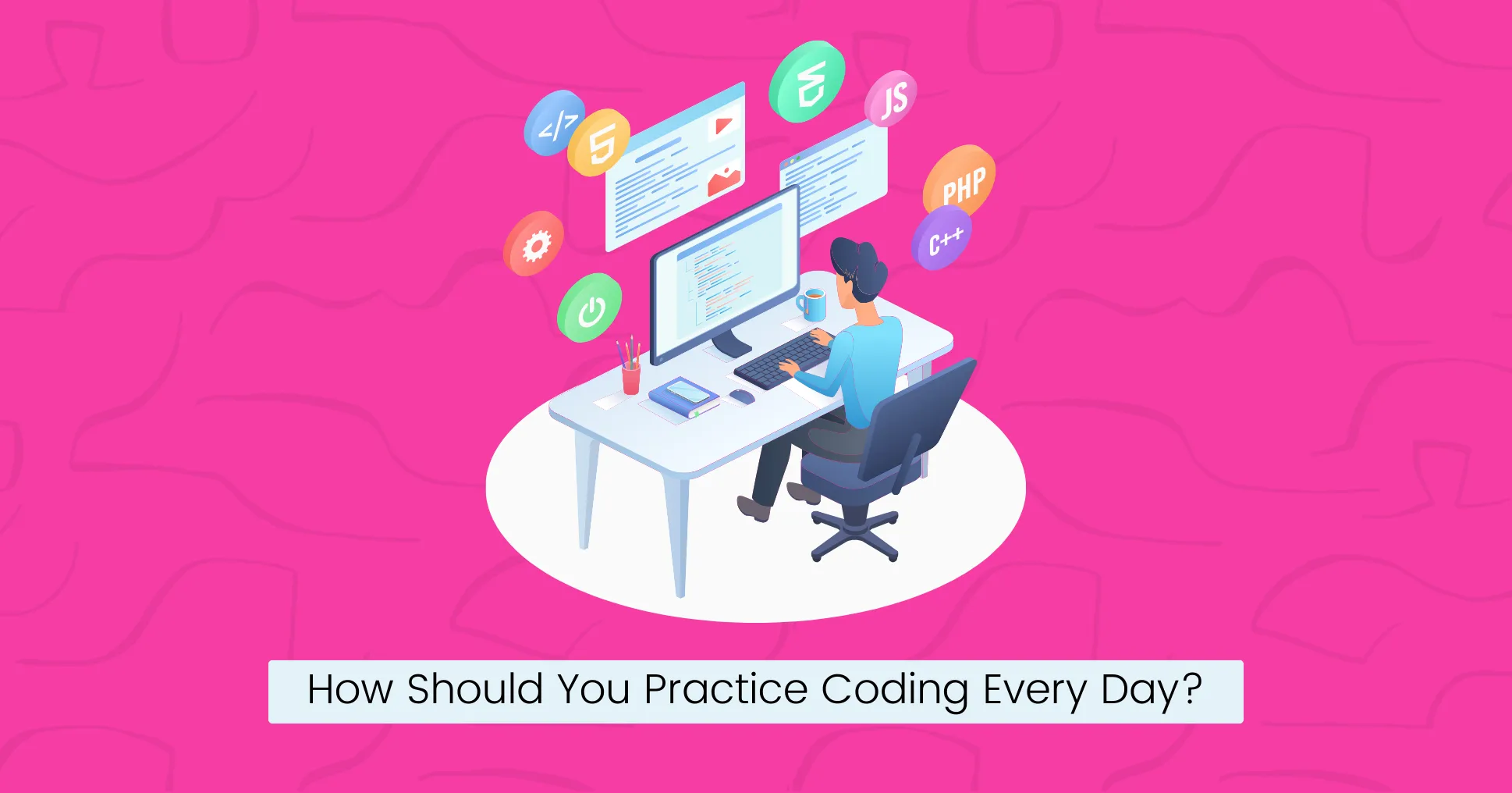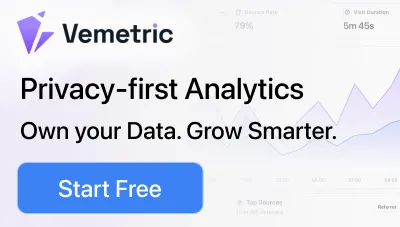
5 Best Ways to Practice Coding Every Day (2024)
Are you finding it hard to make coding a daily habit?
Or do you want to learn how to code as fast as possible but can’t find the time?
Coding every day might be overwhelming, especially if you are a beginner.
You are trying to learn a completely new skill, and it can take some time to reach a level where you can find a full-time job.
With so many distractions, falling behind and becoming stressed out is easy.
That’s why regular practice is important if you want to improve.
This guide will show you how to practice coding every day with simple, effective methods and best practices to solidify your programming skills.
Let’s get started.
Why is it Important to Practice Coding Daily?

Programming is a skill that requires continuous learning and practice.
It is like picking up a new language: You need to understand its structure, syntax, and rules to overcome the initial learning curve.
You’re dealing with concepts and technical coding terms you might have never heard before.
But with time, practice, and a smart learning approach, you can overcome these challenges and become proficient enough to be hired as a full-time developer.
Here are some reasons why you should incorporate coding into your daily routine:
Problem Solving
One of the most challenging aspects of programming is that it requires a problem-solving mindset to manage real-world scenarios.
You need to think critically and be able to break down complex problems into smaller, simpler steps.
This is a skill that takes time and practice to develop. The more problems you solve, the better you will get at finding solutions quickly.
For example, if you find a bug, you can come up with a methodological solution to fix it because you are used to solving problems regularly.
Tip:
Check out this guide on how to solve coding problems and challenges easily.
Consistent Routine
Daily practice helps you develop a consistent routine. This habit is important for long-term growth and success as a software developer.
It is like going to the gym. The more frequently you go, the easier it becomes.
Similarly, the more you code, the faster you will learn. You can also implement what you have learned to clarify your concepts.
When you tackle problems on a daily basis, you get confident to handle complex challenges.
This practical method allows you to see how your code works in real-life situations and builds your skills over time.
Creative Thinking
When you code daily, you strengthen your mind’s ability to think creatively.
You might start seeing new ways to solve a problem or come up with original solutions.
This is a valuable soft skill for a programmer since it allows you to brainstorm and test new ideas.
Strengthen Your Knowledge
If you don’t implement what you have learned, you will forget 70-80% of it in two to three days.
Miss a few more days, and you will start forgetting details, which slows down your progress.
However, If you write a few lines of code daily, you can retain that information.
That’s why daily practice is important to solidify your knowledge.
Tip:
An effective way to retain information is to use the Feynman learning technique, which involves simplifying complex topics into simple concepts that are easy to understand.
Continuous Improvement
Daily coding practice means you are always improving.
Completing even a small task each day will make you feel like you have achieved something, and you will be motivated to tackle the next challenge.
These small improvements add up to your skillset, and you will notice that tasks that once took hours to finish now require half the time and effort.
This continuous improvement is key to becoming a better developer.
How Should You Practice Coding Every Day?

Here are the best ways to help you start coding daily.
Ask yourself why you want to learn to code
The first step is to set clear goals for your learning sessions.
This way, you will know exactly what you are working on, which helps you stay on track and make steady progress.
More importantly, you won’t waste time figuring out what to do next and staying more focused.
Ask yourself these important questions:
- Do you want a career change, or are you learning for fun?
- Do you already have some technical skills, or are you starting from scratch?
- Do you want to learn a new programming language, framework, or tool?
- Do you want to build a project or contribute to open-source projects?
- What kind of resources (online courses, tutorials, etc.) do you have?
- How much time can you invest every day?
Once you have answered these questions, you can set effective goals that are achievable within your time limit.
For example:
Instead of saying, “I’ll code today,” set a simple goal like, “Today, I will add a navigation bar to the homepage.”
This way, you have a clear target that you can easily complete in a single session.
Key tips:
- Identify the problem you want to solve and then break it into a series of manageable steps, such as solving at least three coding problems.
- Spend a fixed time coding daily, such as 30-45 minutes. This will help you form a habit that you can easily stick to.
Choose the resources you need to get started
The next step is to find learning resources that match your goals and skill level.
There are many paid and free resources available online that you can use.
Such as
- Online coding platforms (Udemy, Zero To Mastery, Codeacademy, Coursera).
- Web development books
- Tutorials and blog posts
- YouTube
The resources you use greatly influence how well you understand coding concepts. That’s why you need to carefully consider them before making a decision.
- Consider your skill level: If you are a complete beginner, you can start with introductory courses covering web development basics, such as HTML and CSS.
- Get hands-on experience: Find a course that includes hands-on exercises. Platforms like LeetCode or freeCodeCamp offer coding challenges and projects that you can use to practice every day.
Key tips:
- Start simple and focus on one thing at a time.
- Choose resources that are engaging and up-to-date with relevant content.
- Check reviews to see if your chosen course is suitable for you.
Create a schedule
When you are learning something new, it is easy to get sidetracked.
That’s why having a set time every day to learn is important.
A daily schedule keeps you on track and ensures that you dedicate regular time to coding.
Here’s how you can make a schedule to practice programming daily.
- Start with small time sessions: Working long hours at the start is a huge commitment that you may not always have time for. For example, set your target to 30 minutes daily instead of 3-4 hours. These consistent short sessions will become a habit, and you can gradually increase the time to an hour or two.
- Set a specific time: Create a timetable that you can stick to every day. For example, you can code from 7:00 to 7:30 a.m. before going to work.
Key tips:
- Set up your workplace somewhere quiet where you can focus on coding without interruptions.
- Remove any distractions and turn off notifications on your phone.
- Set a timer for better time management.
Solve real-world problems
Apply your skills to real-world problems and programming projects that interest you.
This makes learning more interesting and reinforces your learning concepts by helping you see how coding skills apply in real life.
For example:
You can write code to build a functional website from scratch and better understand how HTML, CSS, and JavaScript work together in the real world.
Key tips:
- Don’t get discouraged by mistakes. Real-world projects aim to learn, not to write perfect code.
- When you get stuck, don’t hesitate to seek resources or help from online communities and forums.
- Sharing your work with others is a great way to get feedback. Snappify allows you to create beautiful code snippets and share them on your blog or social media platforms.
Track your progress
You can see your progress over time when you track your daily habits.
This helps you stay committed and provides motivation by showing you how far you have come.
You can also identify areas where you might need to improve.
You can do this by using an app, a calendar, or even a notebook to keep track of your daily work.
Key tips:
- Spend a few minutes reflecting on your learning and setting milestones to reach. For example, finishing a specific task by the week’s or month’s end.
- When you hit a milestone or notice that you have kept your streak for a certain period, celebrate your progress and reward yourself for your hard work. This will make the process much more enjoyable and motivating.
Final Words
In conclusion, starting daily coding practice is not difficult. You need effort, focus, and a commitment to learn.
This way, you can improve your coding skills, develop positive habits, gain confidence, and prepare for real-world challenges.
If you like this article, you will also enjoy reading:
- 10 Hard Truths About Being A Software Engineer.
- Principles of software development.
- How to become a 10x developer.
FAQs:
What are the best programming languages for beginners to start coding?
For beginners, Python and JavaScript are the best choices, as they have simple syntaxes and a wide range of learning resources available.
How long does it take to become a programmer?
It depends on individual commitment and skills. It typically takes 6 to 12 months of focused learning and daily practice to become good enough to start working as a programmer.
